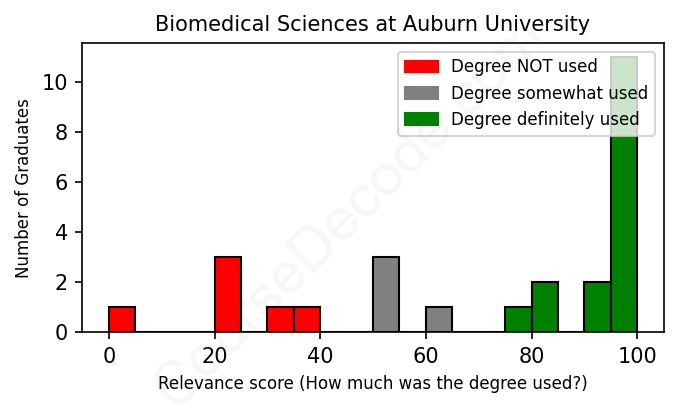
First, some facts. Of the Biomedical Sciences graduates from Auburn University we've analyzed , here's how many have used (or NOT used) their degree in their career:

These are estimates based on AI analysis of 26 LinkedIn profiles (see below).
The verdict? Slightly above average. Overall, with an average relevance score of 71%, Biomedical Sciences graduates from Auburn University have a slightly higher likelihood (+4%) of finding work in this field compared to the average graduate across all fields:
And for comparison, here's the chart for all profiles we've looked at across all degrees.
Also, after graduating, 76% of these graduates have pursued further education other than another Bachelor's degree (such as a Masters degree or other), compared to the average across all profiles of 35%. This suggests you may need more than just a Bachelors degree to be competitive as a Biomedical Sciences graduate.
See the details:
|
Relevance score: 100% We think this person has gone into a career highly relevant to their degree. We think this person has gone into a career highly relevant to their degree.
DEGREE INFOGraduated in 2022 from Auburn University with a Bachelor of Science B.S. in Biomedical Sciences. Also pursued further education since (see below). JOB HISTORY SINCE GRADUATIONMedical Assistant Emory Healthcare 2022 - 2023 FURTHER DEGREES DONE SINCE GRADUATINGMaster of Science - MSAuburn University 2022 - 2024 ABOUTThrough my in depth experiences in fitness, nutrition, and healthcare, I have developed proficiencies in using my background to collaborate with diverse populations. I strive to continue to encapsulate the multifaceted nature of sports medicine and performance in my career |
The top 10 most common jobs done by the graduates we've analyzed (ranked most common to least) are:
When looking at the job trajectories of Auburn University graduates with a degree in Biomedical Sciences, it’s clear that many end up working in the healthcare field, especially as nurses, pharmacists, and medical technicians. For instance, roles like Registered Nurse and Pharmacist not only require intensive biomedical knowledge but also directly apply the skills learned during their studies. Many graduates excel in positions that involve patient care, research, or clinical roles where their biomedical expertise shines, such as Intensive Care Nurses or Clinical Pharmacists. These positions are highly relevant and demonstrate a clear connection to their educational background.
However, not every path taken by these graduates aligns closely with their degree. Some ventured into culinary roles or entirely unrelated fields like sales and marketing, where their knowledge of biomedical sciences played a minimal role, if any at all. While fields like culinary arts and event management might benefit from a general understanding of health and nutrition, they don't require the specialized knowledge acquired during their study. Overall, the most common and relevant jobs for Biomedical Sciences graduates are found within healthcare and research settings, leveraging their specific skill set, while other fields can vary significantly in their relevance to their educational background.
Here is a visual representation of the most common words in job titles for Biomedical Sciences graduates (this is across all Biomedical Sciences graduates we've analyzed, not just those who went to Auburn University):

The career trajectories for graduates with a degree in Biomedical Sciences from Auburn University tend to vary quite a bit. Many of these graduates find their footing in healthcare-related roles shortly after graduation. For instance, roles such as Medical Technicians, Registered Nurses, and Pharmacists dominate the early career landscape. These positions often serve as launching pads into advanced medical fields or specialized roles, especially as graduates gain more experience and pursue further education or certifications. It’s encouraging to see a solid number of graduates moving into roles that are well-aligned with their Biomedical Sciences background, particularly in nursing and pharmacy, where they play key roles in patient care and medication management.
Looking a few years down the line, it seems like many graduates continue to thrive in the healthcare sector. While some might pivot to roles like Clinic Director or pursue advanced degrees, such as medical or pharmacy residencies, others diversify into positions with less direct relevance to Biomedical Sciences, like culinary arts or sales. This broadening of career paths can indicate flexible skills developed during their studies, but it also highlights that not everyone remains strictly within the biomedical field. Overall, the trend points to a mix of successful careers that are relevant to Biomedical Sciences and some graduates exploring various avenues outside their original field of study, potentially leading to both fulfilling and diverse career paths.
Honestly, a Bachelor’s degree in Biomedical Sciences can be pretty challenging, especially if you’re not super into science or math—you're diving into subjects like biology, chemistry, and anatomy, which can get intense! At Auburn University, it’s no walk in the park; you'll have your share of tough exams and lab work. That said, it's definitely doable for most students who are willing to put in the effort and stay organized. If you're passionate about the subject matter, you'll likely find it more enjoyable, so it all comes down to your interests and how well you handle the workload. Overall, it leans more toward the harder side compared to some other degrees, but it's all about what you make of it!
Most commonly, in the LinkedIn profiles we've looked at, it takes people 4 years to finish a Bachelor degree in Biomedical Sciences.
So, looking at this list of Auburn University Biomedical Sciences grads, it seems like some folks are really doing well financially, while others are still figuring it out. For example, the directors and vice presidents in the culinary field or someone like the family dentist are likely raking in decent salaries. On the flip side, some of the younger grads in entry-level roles or internships might not be making as much. Like, a pharmacy intern or a lab tech just starting out might not bring in big bucks right away. Overall, it looks like a mix—if you’re aiming for those higher positions, there’s money to be made, but it can take a bit to get there!
Here is a visual representation of the most common words seen in the "about" section of LinkedIn profiles who have a Bachelor degree in Biomedical Sciences (this is across all Biomedical Sciences graduates we've analyzed, not just those who went to Auburn University). This may or may not be useful:

Here are all colleges offering a Bachelor degree in Biomedical Sciences (ordered by the average relevance score of their Biomedical Sciences graduates, best to worst) where we have analyzed at least 10 of their graduates:
| College | Score | Count |
|---|---|---|
 Western Michigan University Western Michigan University
|
81 | 17 |
 Marquette University Marquette University
|
78 | 29 |
 University of Michigan University of Michigan
|
77 | 10 |
 Colorado State University Colorado State University
|
77 | 19 |
 University at Buffalo University at Buffalo
|
75 | 18 |
 California Polytechnic State University-San Luis Obispo California Polytechnic State University-San Luis Obispo
|
74 | 13 |
 University of Connecticut University of Connecticut
|
74 | 15 |
 Texas A&M University Texas A&M University
|
73 | 59 |
 Auburn University Auburn University
|
71 | 26 |
 Northern Arizona University Northern Arizona University
|
71 | 15 |
 Rensselaer Polytechnic Institute Rensselaer Polytechnic Institute
|
70 | 10 |
 University of Central Florida University of Central Florida
|
69 | 26 |
 University of South Florida University of South Florida
|
68 | 48 |
 Georgia Institute of Technology Georgia Institute of Technology
|
67 | 41 |
 The Ohio State University The Ohio State University
|
64 | 14 |
 Rochester Institute of Technology Rochester Institute of Technology
|
64 | 12 |
 Case Western Reserve University Case Western Reserve University
|
63 | 12 |
 Grand Valley State University Grand Valley State University
|
59 | 35 |
 Arizona State University Arizona State University
|
58 | 12 |